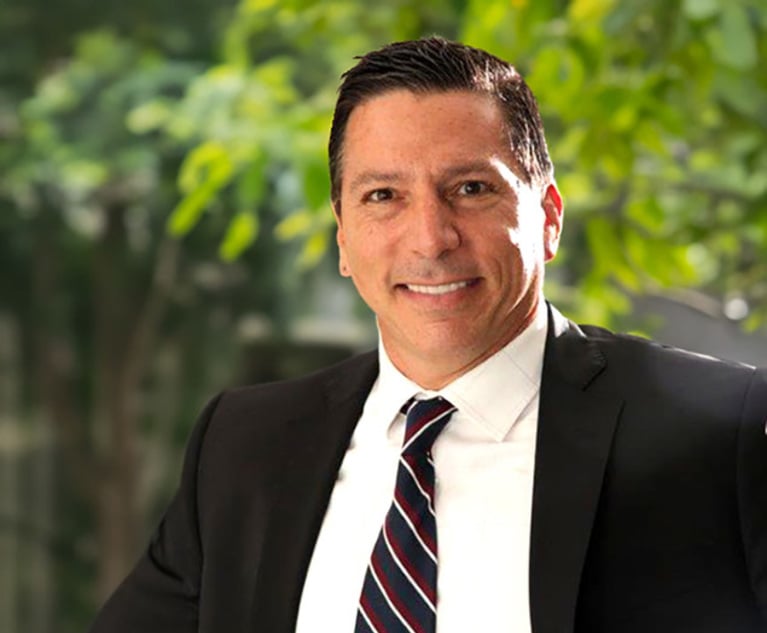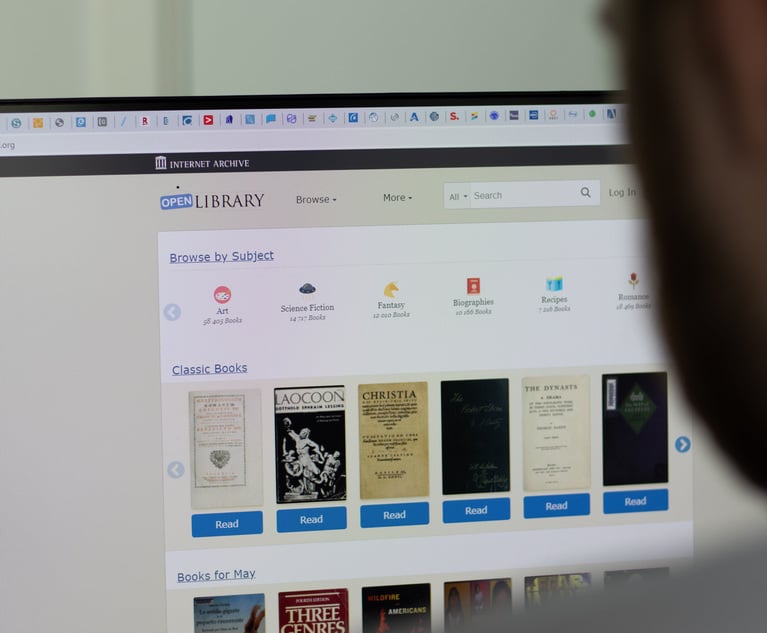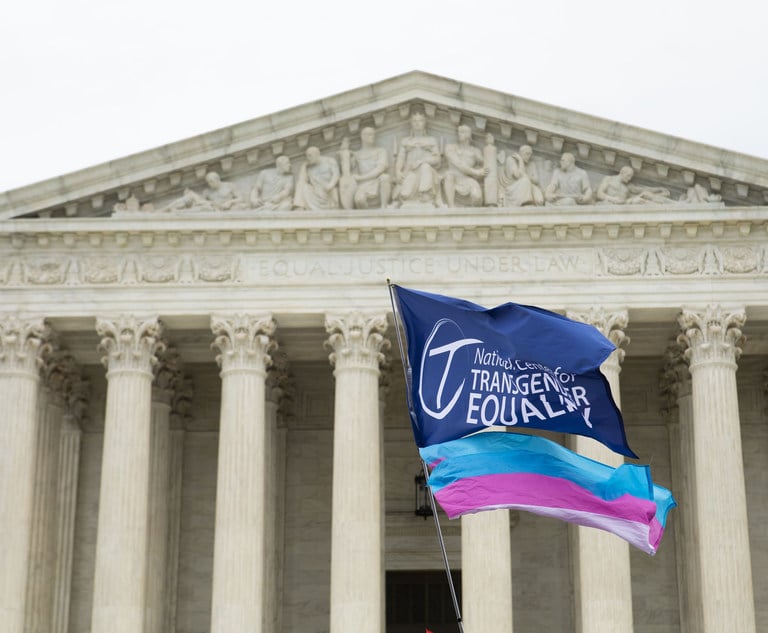Lights, Camera, Action at UCLA Law for Documentary Film Clinic
In January 2018, documentary filmmakers will have a new resource at the UCLA School of Law.
November 15, 2017 at 05:58 PM
6 minute read
 Dale Cohen, the director of UCLA's new Documentary Film Legal Clinic. Photo: UCLA.
Dale Cohen, the director of UCLA's new Documentary Film Legal Clinic. Photo: UCLA.
Documentary filmmakers often face an uphill battle—due to high costs, wary sources and confusing contracts paired with limited time and funding.
In January 2018, they'll have a new resource at the University of California, Los Angeles, School of Law. The school announced Wednesday that it will be offering free legal assistance to independent filmmakers at its new Documentary Film Legal Clinic, opening spring semester.
“It's become clear that there are a lot of independent filmmakers who could use legal assistance, whether its training, contracts, IP, privacy or libel,” said Dale Cohen, the clinic's director. “But they simply can't afford to do it.”
The clinic, part of UCLA's Ziffren Center for Media, Entertainment, Technology and Sports Law, will provide pro bono legal assistance to filmmakers from 14 second- and third-year UCLA law students, who will work under the guidance of Cohen and another experienced attorney.
UCLA's reputation for entertainment law and proximity to Hollywood means a lot of students at the school are already interested in the legal side of documentaries, according to Cohen. Many have experience in documentary filmmaking themselves.
“A lot of students come here wanting to get into the film business or media law,” Cohen said. “And the skills they learn in this clinic will extend beyond film business.”
Students won't just work with clients. They'll also go through simulations and seminars to learn about important legal newsgathering steps, such as filing public records requests and copyright clearances.
They'll also learn about and get experience providing legal advice on defamation, libel and privacy, which Cohen says are the top concerns of many independent filmmakers he's spoken with. While many documentarians want to expose the corruption and criminal behavior of powerful public figures, they're often threatened with lawsuits.
And when filmmakers are discouraged from making such documentaries, entire communities lose out on a chance to talk about crucial issues and make changes.
That's one of the main reasons Cohen says he's excited for the clinic: In an era of dwindling newsroom resources, its important to ensure that communities are getting the content they need to make informed decisions.
“It's going to be great for students in terms of developing skills and hopefully long-term relationships, terrific for the filmmakers who really need the help, and for the communities, who need to get their stories out,” Cohen said.
The documentary filmmaker clinic is one of many that UCLA plans to open in the upcoming year. Other new clinics will focus on immigration advocacy and music law. In the last year, UCLA has opened legal clinics for immigration policy, human rights and services for veterans.
 Dale Cohen, the director of UCLA's new Documentary Film Legal Clinic. Photo: UCLA.
Dale Cohen, the director of UCLA's new Documentary Film Legal Clinic. Photo: UCLA.
Documentary filmmakers often face an uphill battle—due to high costs, wary sources and confusing contracts paired with limited time and funding.
In January 2018, they'll have a new resource at the University of California, Los Angeles, School of Law. The school announced Wednesday that it will be offering free legal assistance to independent filmmakers at its new Documentary Film Legal Clinic, opening spring semester.
“It's become clear that there are a lot of independent filmmakers who could use legal assistance, whether its training, contracts, IP, privacy or libel,” said Dale Cohen, the clinic's director. “But they simply can't afford to do it.”
The clinic, part of UCLA's Ziffren Center for Media, Entertainment, Technology and Sports Law, will provide pro bono legal assistance to filmmakers from 14 second- and third-year UCLA law students, who will work under the guidance of Cohen and another experienced attorney.
UCLA's reputation for entertainment law and proximity to Hollywood means a lot of students at the school are already interested in the legal side of documentaries, according to Cohen. Many have experience in documentary filmmaking themselves.
“A lot of students come here wanting to get into the film business or media law,” Cohen said. “And the skills they learn in this clinic will extend beyond film business.”
Students won't just work with clients. They'll also go through simulations and seminars to learn about important legal newsgathering steps, such as filing public records requests and copyright clearances.
They'll also learn about and get experience providing legal advice on defamation, libel and privacy, which Cohen says are the top concerns of many independent filmmakers he's spoken with. While many documentarians want to expose the corruption and criminal behavior of powerful public figures, they're often threatened with lawsuits.
And when filmmakers are discouraged from making such documentaries, entire communities lose out on a chance to talk about crucial issues and make changes.
That's one of the main reasons Cohen says he's excited for the clinic: In an era of dwindling newsroom resources, its important to ensure that communities are getting the content they need to make informed decisions.
“It's going to be great for students in terms of developing skills and hopefully long-term relationships, terrific for the filmmakers who really need the help, and for the communities, who need to get their stories out,” Cohen said.
The documentary filmmaker clinic is one of many that UCLA plans to open in the upcoming year. Other new clinics will focus on immigration advocacy and music law. In the last year, UCLA has opened legal clinics for immigration policy, human rights and services for veterans.
This content has been archived. It is available through our partners, LexisNexis® and Bloomberg Law.
To view this content, please continue to their sites.
Not a Lexis Subscriber?
Subscribe Now
Not a Bloomberg Law Subscriber?
Subscribe Now
NOT FOR REPRINT
© 2024 ALM Global, LLC, All Rights Reserved. Request academic re-use from www.copyright.com. All other uses, submit a request to [email protected]. For more information visit Asset & Logo Licensing.
You Might Like
View All
Florida Court Rules in Favor of Production Co. in Dispute Over Viral Documentary 'Died Suddenly'


Court rejects request to sideline San Jose State volleyball player on grounds she’s transgender
4 minute read
Netflix Offices Raided by Authorities in Paris and Amsterdam
Trending Stories
Who Got The Work
Michael G. Bongiorno, Andrew Scott Dulberg and Elizabeth E. Driscoll from Wilmer Cutler Pickering Hale and Dorr have stepped in to represent Symbotic Inc., an A.I.-enabled technology platform that focuses on increasing supply chain efficiency, and other defendants in a pending shareholder derivative lawsuit. The case, filed Oct. 2 in Massachusetts District Court by the Brown Law Firm on behalf of Stephen Austen, accuses certain officers and directors of misleading investors in regard to Symbotic's potential for margin growth by failing to disclose that the company was not equipped to timely deploy its systems or manage expenses through project delays. The case, assigned to U.S. District Judge Nathaniel M. Gorton, is 1:24-cv-12522, Austen v. Cohen et al.
Who Got The Work
Edmund Polubinski and Marie Killmond of Davis Polk & Wardwell have entered appearances for data platform software development company MongoDB and other defendants in a pending shareholder derivative lawsuit. The action, filed Oct. 7 in New York Southern District Court by the Brown Law Firm, accuses the company's directors and/or officers of falsely expressing confidence in the company’s restructuring of its sales incentive plan and downplaying the severity of decreases in its upfront commitments. The case is 1:24-cv-07594, Roy v. Ittycheria et al.
Who Got The Work
Amy O. Bruchs and Kurt F. Ellison of Michael Best & Friedrich have entered appearances for Epic Systems Corp. in a pending employment discrimination lawsuit. The suit was filed Sept. 7 in Wisconsin Western District Court by Levine Eisberner LLC and Siri & Glimstad on behalf of a project manager who claims that he was wrongfully terminated after applying for a religious exemption to the defendant's COVID-19 vaccine mandate. The case, assigned to U.S. Magistrate Judge Anita Marie Boor, is 3:24-cv-00630, Secker, Nathan v. Epic Systems Corporation.
Who Got The Work
David X. Sullivan, Thomas J. Finn and Gregory A. Hall from McCarter & English have entered appearances for Sunrun Installation Services in a pending civil rights lawsuit. The complaint was filed Sept. 4 in Connecticut District Court by attorney Robert M. Berke on behalf of former employee George Edward Steins, who was arrested and charged with employing an unregistered home improvement salesperson. The complaint alleges that had Sunrun informed the Connecticut Department of Consumer Protection that the plaintiff's employment had ended in 2017 and that he no longer held Sunrun's home improvement contractor license, he would not have been hit with charges, which were dismissed in May 2024. The case, assigned to U.S. District Judge Jeffrey A. Meyer, is 3:24-cv-01423, Steins v. Sunrun, Inc. et al.
Who Got The Work
Greenberg Traurig shareholder Joshua L. Raskin has entered an appearance for boohoo.com UK Ltd. in a pending patent infringement lawsuit. The suit, filed Sept. 3 in Texas Eastern District Court by Rozier Hardt McDonough on behalf of Alto Dynamics, asserts five patents related to an online shopping platform. The case, assigned to U.S. District Judge Rodney Gilstrap, is 2:24-cv-00719, Alto Dynamics, LLC v. boohoo.com UK Limited.
Featured Firms
Law Offices of Gary Martin Hays & Associates, P.C.
(470) 294-1674
Law Offices of Mark E. Salomone
(857) 444-6468
Smith & Hassler
(713) 739-1250






